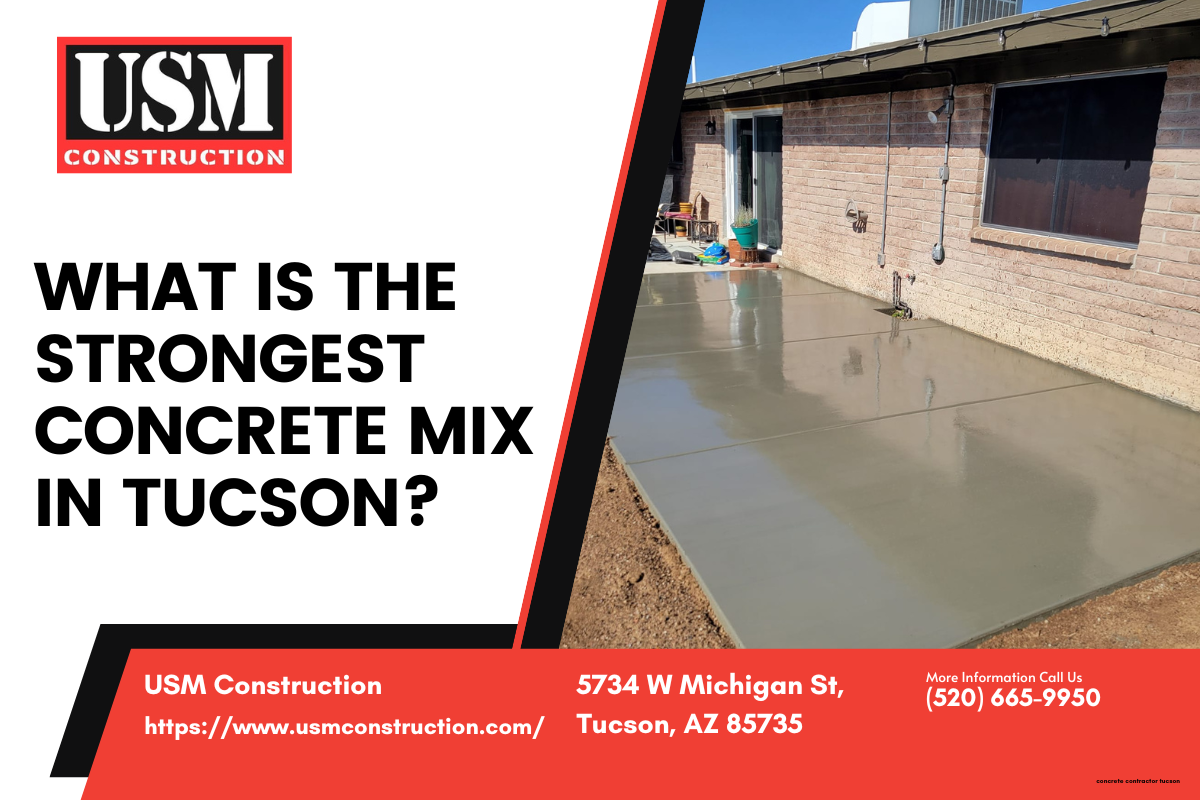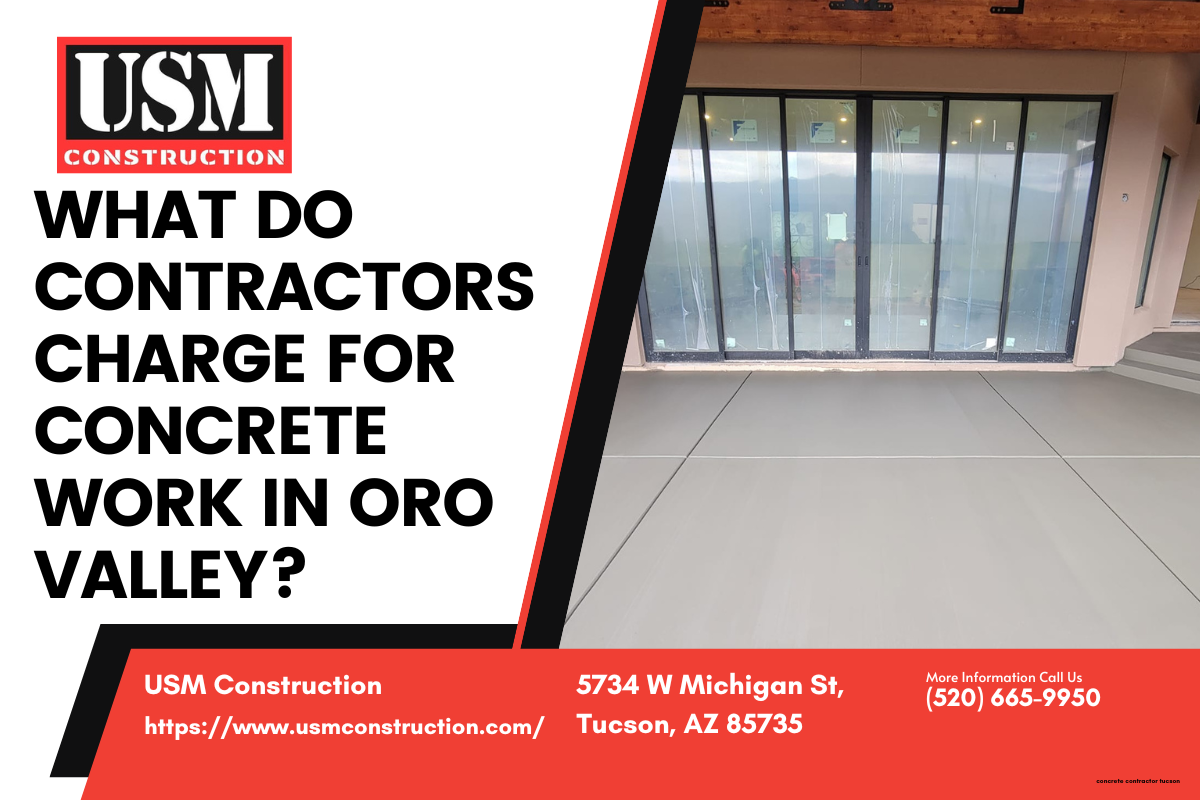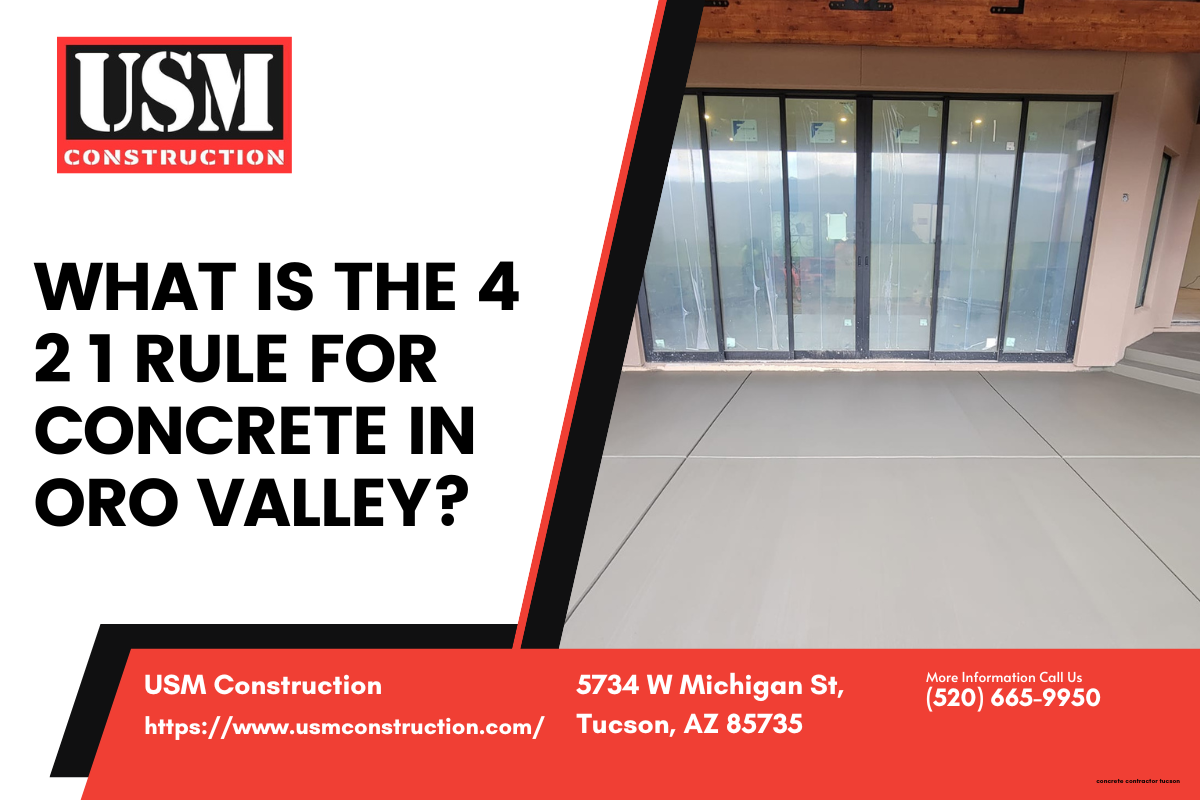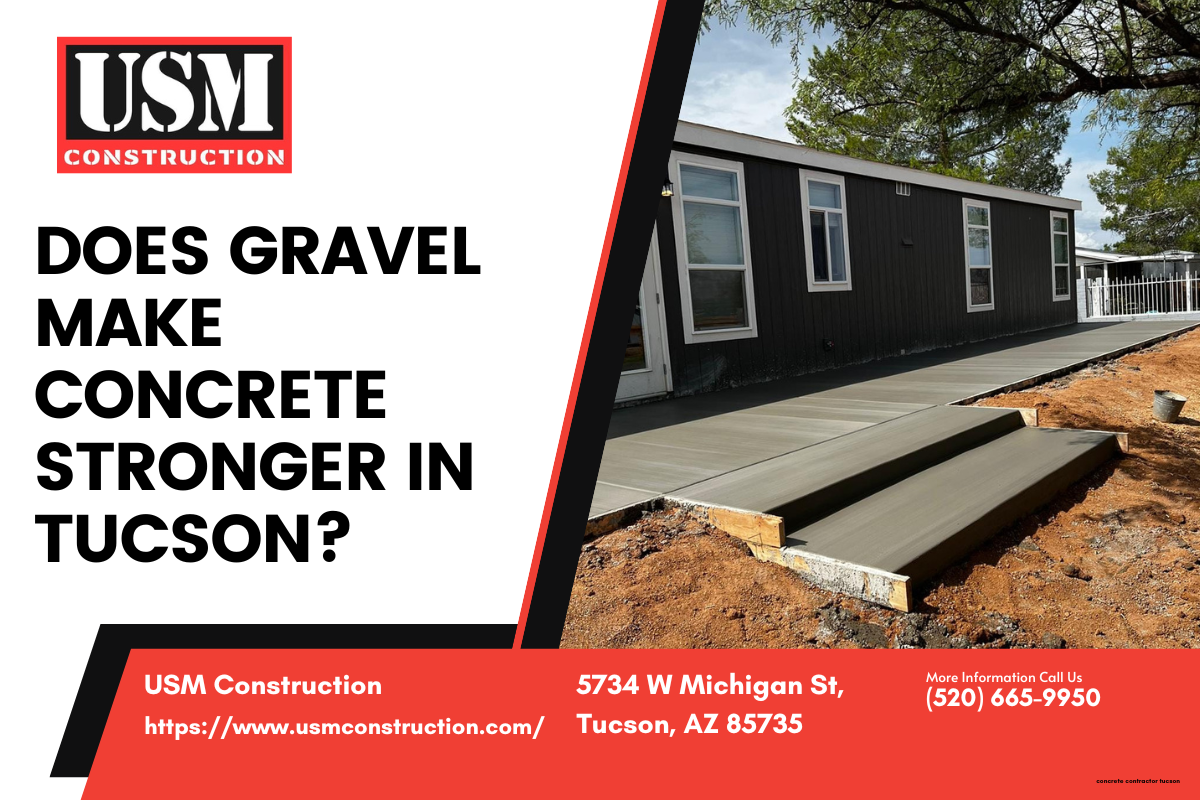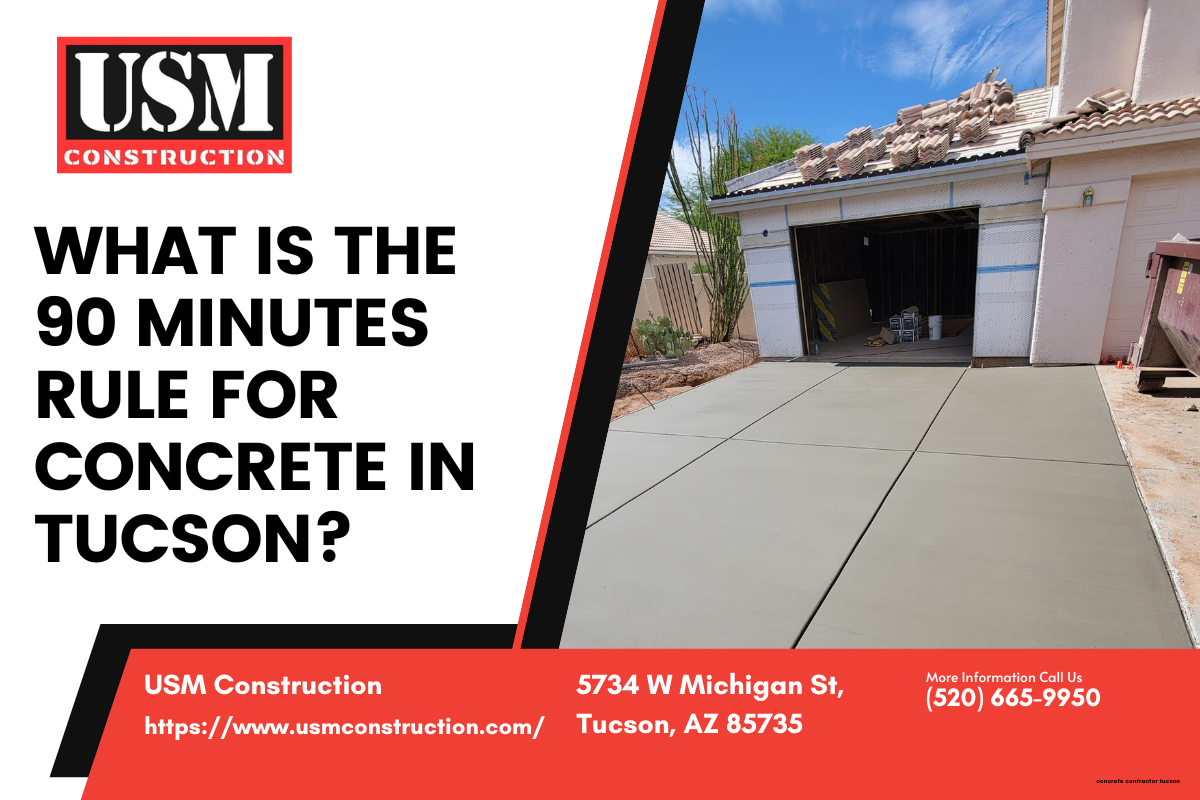TABLE OF CONTENTS
The strongest concrete mix in Tucson isn't a simple recipe or a bag from a big-box store. True, lasting strength comes from a professionally engineered concrete solution designed specifically to combat the destructive effects of Southern Arizona's intense heat and challenging caliche soil, with strength measured in PSI (Pounds per Square Inch) tailored to the specific application, from a 3500 PSI patio to a 5500+ PSI commercial foundation.
The Myth of the One-Size-Fits-All "Strongest" Concrete Mix
As concrete contractors with decades of experience serving Tucson, from Oro Valley to Sahuarita, we at USM Construction LLC get this question constantly: "What's your strongest mix?" It's a great question, but it’s based on a common misconception. Many people think of concrete like a cake recipe—that there's one perfect ratio of cement, sand, and gravel that creates the ultimate product. In reality, the quest for the "strongest" concrete is less about a universal formula and more about a specific diagnosis for your project's unique challenges.
The true measure of a concrete mix's strength is its ability to withstand the forces it will encounter over its lifetime. In Tucson, those forces are formidable: relentless sun, extreme temperature swings, and unforgiving soil. A mix that’s perfect for a footing in a milder climate could fail spectacularly here. That’s why we have to think beyond simple ratios and focus on performance-based engineering.
Debunking the '4-2-1 Rule' and Embracing PSI
You may have heard of the "4-2-1 rule" (4 parts gravel, 2 parts sand, 1 part cement) as the standard concrete mix ratio for maximum strength. While it's a decent starting point for small, non-structural projects, relying on it for anything critical in Tucson is a gamble. Why? Because volume is an imprecise measure. The moisture content of sand and the specific size and shape of the gravel (the aggregate) can dramatically alter the final properties.
Professionals in the construction industry don't talk about strength in "parts." We measure it in PSI (Pounds per Square Inch). PSI is a measurement of compressive strength—how much force the concrete can withstand before it breaks. This is determined through rigorous understanding concrete compression tests performed in a lab. When you order from a ready mix supplier like CalPortland or work with a contractor like USM Construction, you specify the required PSI, not a volumetric ratio.
A Practical Guide to PSI Requirements in Tucson
The right PSI is entirely dependent on the application. Using a 5000 PSI mix for a simple garden walkway is overkill and a waste of money. Conversely, using a 3000 PSI mix for a heavy-duty industrial floor is a recipe for catastrophic failure. Here’s a general guide for projects in our area:
- Residential Patios & Walkways: 3000 - 3500 PSI is typically sufficient for foot traffic and outdoor furniture.
- Best Concrete for Driveway in Tucson: We recommend a minimum of 4000 PSI to handle the weight of vehicles and resist cracking from the sun.
- What PSI Concrete for House Foundation in Arizona: Standard foundations in Tucson and Pima County usually require 3000 - 4000 PSI, though engineering specifications for concrete in Tucson can vary based on soil reports and structural loads.
- Concrete for Garage Floor in Arizona: 4000 - 4500 PSI with fiber mesh reinforcement is ideal to handle vehicles, tools, and prevent surface damage.
- Tucson Commercial Construction Concrete & Industrial Flooring: These high-demand applications often require a 5000 PSI concrete mix or higher, sometimes exceeding 6000 PSI for specialized uses like precast solutions or heavy machinery pads.
Tucson's Climate: The True Test of Concrete Strength
Pouring concrete in the Sonoran Desert presents challenges that contractors in cooler, more humid climates never face. The single greatest enemy of fresh concrete is rapid water evaporation. The chemical reaction that gives concrete its strength, called hydration, requires water. If that water evaporates too quickly under the intense Tucson sun, the reaction stops, resulting in a weak, brittle slab full of shrinkage cracks.
Battling the Heat: Why Curing Is Everything
The placement and curing process is just as important as the mix itself. In fact, pavement designers consider factors like soil conditions and climate just as crucial as the mix ingredients to determine a concrete's required properties according to pavement design experts. During our brutal summer months, experienced Tucson concrete contractors must take extraordinary measures.
For large-scale projects, this often means working at night. As the Arizona Department of Transportation notes, when temperatures are 100 degrees or higher, "crews must mix and place Portland Cement Concrete Pavement (PCCP) at night to prevent rapid water evaporation which reduces the concrete's strength." This is standard practice for ADOT and a technique we employ at USM Construction for critical commercial slab and foundation work. For daytime pours, we use techniques like:
- Using chilled water in the mix.
- Applying a high-quality curing compound immediately after finishing to lock in moisture.
- Using fog misters to raise the ambient humidity around the slab.
The Unsung Heroes: Essential Chemical Admixtures
Modern concrete is rarely just cement, water, sand, and gravel. To achieve high-performance concrete solutions in Tucson, we rely on a suite of chemical admixtures—specialty additives that modify the concrete's properties.
- Water-Reducers (Superplasticizers): These additives allow us to create a workable, flowable mix with significantly less water. A lower water-to-cement ratio is a primary driver of higher compressive strength.
- Retarders: In 105°F heat, concrete can start to set before the crew even has a chance to finish it properly. Retarders are crucial additives for stronger concrete in Tucson because they slow down the hydration process, giving us the necessary time to place, consolidate, and finish the slab correctly.
- Air-Entraining Agents: These create microscopic air bubbles in the concrete, which helps it resist damage from the freeze-thaw cycles we sometimes experience in the desert winter.
Strength Starts Below the Surface: Conquering Tucson's Caliche Soil
You could order the highest PSI concrete Tucson has to offer, but if it's poured on an improperly prepared base, it will fail. This is the most overlooked aspect of achieving strong, long-lasting concrete in Southern Arizona. Our region is famous for its caliche soil—a hard, almost concrete-like layer of soil cemented by calcium carbonate.
While hard, caliche is problematic. It doesn't drain well and can be expansive, meaning it swells when wet and shrinks when dry. This movement puts immense stress on any foundation or slab built on top of it, leading to heaving, cracking, and structural failure. Even a 5000 PSI engineered slab will crack if the ground beneath it is unstable.
Proper sub-grade preparation is non-negotiable. This involves:
- Excavation: Removing the problematic caliche and native soil to a specified depth.
- Moisture Conditioning: Thoroughly watering the sub-grade to achieve optimal moisture content, preventing the dry ground from sucking water out of the concrete mix.
- Compaction: Compacting the sub-grade to create a stable, unmoving platform.
- Engineered Fill: Bringing in and compacting a proper base course of ABC (Aggregate Base Course) gravel to ensure proper drainage and load distribution.
This meticulous ground preparation is the true foundation of strength. USM Construction provides concrete solutions for difficult soil because we know that what’s underneath is as important as the concrete itself.
Standard Mix vs. Engineered Solution: A Comparison for Tucson Projects
Understanding the difference between a generic mix and a professionally engineered solution is key to making a confident decision for your project.
Frequently Asked Questions About Concrete Strength
We believe in empowering our clients with knowledge. Here are answers to some common questions we hear.
What is the highest strength concrete mix?Technically, ultra-high-performance concrete (UHPC) can exceed 20,000 PSI, but this is a specialty product for major infrastructure. For most commercial projects, asking "is 6000 PSI concrete available in Tucson?" is a more practical question, and the answer is yes. The strongest mix is the one correctly engineered and specified for the job's requirements.Which is stronger, C25 or C30 concrete?C30 is stronger. This "C" classification is common in Europe and Canada. The number represents the concrete's compressive strength in megapascals (MPa) after 28 days. C30 has a characteristic strength of 30 MPa, which is roughly equivalent to 4350 PSI.Which is better, M20 or M30 concrete?M30 is stronger and therefore "better" for applications requiring higher strength. The "M" stands for "Mix" and is a designation used in India. M20 corresponds to a strength of about 2900 PSI, while M30 is about 4350 PSI.What is poor man's concrete?This typically refers to a soil-cement mixture, where native soil is mixed with a small amount of Portland cement and water. It is not a structural material and should never be used for foundations, slabs, or footings. It's sometimes used for rustic pathways or as a sub-base stabilizer.
Making the Right Choice for Your Needs
The "strongest" concrete is the one that's right for you. Your project's unique demands, location, and long-term goals dictate the optimal solution. The fact that authorities in Pima County and the City of Tucson are noted for being open to alternative building materials shows an institutional understanding that our region requires tailored, intelligent construction methods.
For the Tucson Homeowner
Your goal is a durable and beautiful investment that withstands the elements. For a new driveway, a pool deck, or a foundation for an addition, you need a long-lasting concrete formula that resists cracking from both the summer heat and shifting soil. This means focusing on a contractor who emphasizes proper sub-grade preparation and uses a 4000+ PSI mix with appropriate reinforcements and curing techniques.
For the Commercial Developer
Your priorities are structural integrity, safety, and compliance with the Tucson building code for concrete strength. For a large-scale foundation, parking structure, or commercial slab, you need a high-performance, engineered solution. This involves a custom concrete blend designed to handle heavy loads, meet strict engineering specifications, and ensure the long-term value of your asset. Concrete is very strong in compression but is vulnerable to seismic stress, highlighting that even high-PSI materials must be engineered for all regional challenges.
For the Civil Project Manager
Your responsibility is to public safety and infrastructure longevity. For roads, bridges, or water channels, you require a precisely engineered, high-durability concrete that meets stringent ADOT or Pima County standards. The focus is on a mix with a verifiable PSI, proven durability against high traffic and extreme weather, and installation by a team with a deep understanding of public works specifications.
Ultimately, achieving the strongest, most durable concrete in Tucson requires a holistic approach. It’s a science that balances a custom concrete blend with meticulous site preparation and climate-aware installation techniques. At USM Construction LLC, this engineered approach is the cornerstone of our work. For a professional assessment of your project and a concrete solution designed to last, contact our expert team today for a complimentary consultation and quote.

